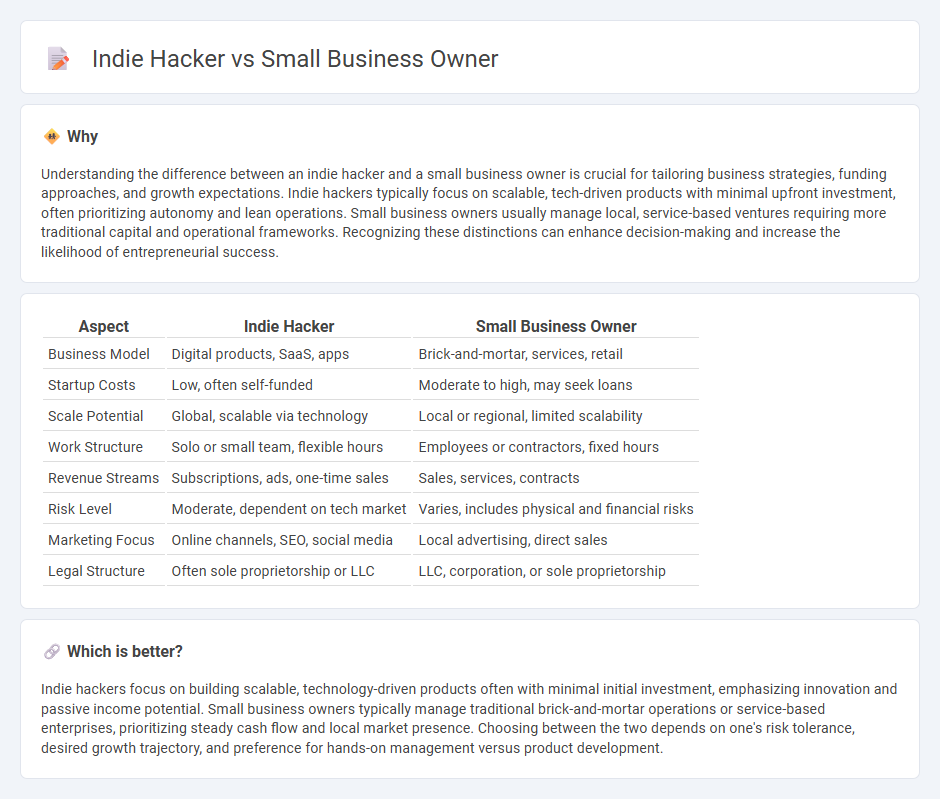
Indie hackers focus on building scalable online products with minimal initial investment, leveraging technology and automation to grow quickly. Small business owners typically manage local, traditional enterprises requiring hands-on operations and customer interaction. Explore the distinct strategies and mindsets that define these entrepreneurial paths.
Why it is important
Understanding the difference between an indie hacker and a small business owner is crucial for tailoring business strategies, funding approaches, and growth expectations. Indie hackers typically focus on scalable, tech-driven products with minimal upfront investment, often prioritizing autonomy and lean operations. Small business owners usually manage local, service-based ventures requiring more traditional capital and operational frameworks. Recognizing these distinctions can enhance decision-making and increase the likelihood of entrepreneurial success.
Comparison Table
| Aspect | Indie Hacker | Small Business Owner |
|---|---|---|
| Business Model | Digital products, SaaS, apps | Brick-and-mortar, services, retail |
| Startup Costs | Low, often self-funded | Moderate to high, may seek loans |
| Scale Potential | Global, scalable via technology | Local or regional, limited scalability |
| Work Structure | Solo or small team, flexible hours | Employees or contractors, fixed hours |
| Revenue Streams | Subscriptions, ads, one-time sales | Sales, services, contracts |
| Risk Level | Moderate, dependent on tech market | Varies, includes physical and financial risks |
| Marketing Focus | Online channels, SEO, social media | Local advertising, direct sales |
| Legal Structure | Often sole proprietorship or LLC | LLC, corporation, or sole proprietorship |
Which is better?
Indie hackers focus on building scalable, technology-driven products often with minimal initial investment, emphasizing innovation and passive income potential. Small business owners typically manage traditional brick-and-mortar operations or service-based enterprises, prioritizing steady cash flow and local market presence. Choosing between the two depends on one's risk tolerance, desired growth trajectory, and preference for hands-on management versus product development.
Connection
Indie hackers and small business owners both prioritize autonomy and innovation in their ventures, leveraging digital tools to build scalable products or services. They often operate with limited resources, focusing on customer feedback and agile development to achieve sustainable growth. This shared entrepreneurial mindset fosters a community that values resilience, creativity, and direct engagement with target markets.
Key Terms
**Small Business Owner:**
A small business owner typically manages a local or niche enterprise with a structured team and physical presence, prioritizing steady revenue streams and customer relationships. They navigate regulatory requirements, payroll, and inventory while aiming for sustainable growth within a competitive market. Explore more about the distinct advantages and challenges of being a small business owner.
Cash Flow
Small business owners prioritize consistent cash flow to cover operational expenses, employee salaries, and inventory costs, ensuring business stability and growth. Indie hackers often emphasize generating sustainable revenue through scalable digital products or services, optimizing for profitability with minimal overhead. Explore strategies to manage cash flow effectively in both small businesses and indie hacking ventures.
Local Market
Small business owners prioritize establishing a strong presence within local markets by offering personalized services and building community relationships. Indie hackers typically leverage digital platforms to reach a global audience, focusing on scalable online products and minimal physical infrastructure. Explore how each approach impacts market reach and customer engagement in localized versus digital economies.
Source and External Links
How to start and fund your own business | USAGov - The Small Business Administration (SBA) offers a 10-step guide to plan, launch, and manage a small business including funding options and local support resources for various business owner groups.
What It Takes to Be a Successful Small Business Owner in 2025 - Successful small business owners need qualities like determination, adaptability, and risk-taking, and in the U.S., a small business is generally defined as having less than 500 employees or under $7 million in revenue.
10 steps to start your business | U.S. Small Business Administration - Key legal and financial steps for starting a business include choosing and registering a business name, getting federal and state tax IDs, applying for licenses and permits, and opening a business bank account.
 dowidth.com
dowidth.com